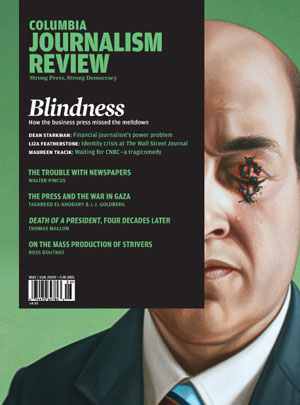 This month’s Columbia Journalism Review (CJR) focuses on the role of the media in the credit crisis stock market and economic collapse.
This month’s Columbia Journalism Review (CJR) focuses on the role of the media in the credit crisis stock market and economic collapse.
My interest in this area goes back a long way; its the reason why I did the media panel at TBP.
Its very interesting criticism, and worthy Sunday reading.
There are 3 articles of particular interest:
• Power Problem: The business press did everything but take on the institutions that brought down the financial system:
“Without facts, the public is powerless. With them, well, it can lick Countrywide and Goldman Sachs put together. In his book, Liberty and the News, Lippmann wrote: “Everywhere today men are conscious that somehow they must deal with questions more intricate than any church or school had prepared them to understand. Increasingly, they know they cannot understand them if facts are not quickly and steadily available.” Without them, he says, there can be no liberty.
He was talking about a crude and corrupt press that manipulated public opinion around World War I. We’re dealing with a financial press that is neither of those things, but is nonetheless a battered and buffeted institution that in the last decade saw its fortunes and status plummet as the institutions it covered ruled the earth and bent the government. The press, I believe, began to suffer from a form of Stockholm Syndrome. Now, it is in the awkward position of telling its readers they were insufficiently attentive to what it wrote.”
Waiting for CNBC: A tragicomedy in one long act:
“The worst recession most americans have seen has accelerated a full-bore depression in the industry of journalism. About 12,000 journalists have joined the unemployment statistics since January 2007 by CJR’s count; in the business universe, fifty-five weekday standalone business sections have died since the fall of 2007, most recently at The Fayetteville Observer, along with nineteen once-weekly sections, according to Chris Roush, who teaches journalism at the University of North Carolina at Chapel Hill.
All this is part of the reason armchair ombudsmen are so very disappointed in CNBC these days. Serious journalists track down the fudged documents that unscrupulous mortgage brokers used to qualify dementia-stricken octogenarians living on $1,100 for $2,400-a-month adjustable-rate mortgages, as The Washington Post did in November. Serious journalists file Freedom Of Information Act requests with the Federal Reserve demanding the details on the financial institutions that reaped the rewards of the aig bailout, and hunt down the discredited statisticians who built the foolproof model by which the firm catastrophically oversold and underpriced obscure credit derivatives that would take down the global economy. They retrace the chain of events whereby the most egregious abusers in the financial system lobbied to be regulated by the three-martini-lunching slackers at the Office of Thrift Supervision. Serious journalists have worked ninety-hour weeks for a bonus-free sixty or seventy grand a year, only to find themselves released into the running pink-slip party that has already claimed their friends.”
Identity Crisis: The Wall Street Journal steers away from what made it great:
“In December 2008, a year after* Rupert Murdoch’s News Corp. purchased The Wall Street Journal, the paper had a holiday “party.” Each news department was escorted separately, in turn, into a brightly lit conference room. A large horseshoe-shaped conference table took up most of the space, leaving little room to stand. Amenities were sparse. “They spent maybe $30 on the little plastic wineglasses,” recalls a reporter who, like nearly every Journal employee interviewed for this article, requested anonymity. Everyone hovered awkwardly at the side of the horseshoe. Then Robert Thomson, the Australian editor hired by Murdoch to run the paper, made his entrance. He seemed—and Journal reporters often characterize him this way—unsure of what to say to his employees. “He said we were up seven percentage points. He said something about a focus group. He told us we were moving the needle,” the reporter says. “After an hour, they flashed the lights and it was time for another group to come in. I thought, ‘Thanks, that’s really why we went into journalism. To move the needle.’”
At the Journal’s offices in lower Manhattan, just about everyone is grateful that the new owner has deep pockets and is willing to invest in reporting—both rare commodities in the industry these days. Yet there are reasons to fear that in the midst of a global financial crisis, arguably the biggest test a business newspaper could face, with greater demand for high-quality journalism on finance and the economy than at anytime in decades, the Journal is abandoning values that have long distinguished it: a commitment to deep reporting and elegant writing. Murdoch and his team can keep news organizations afloat. They can move the needle of a media company—they’ve proven that over the decades. But though Murdoch went to considerable lengths to acquire the Journal, he and his top lieutenants have displayed barely disguised contempt for its core strengths. They have moved the paper decisively toward a more terse, scoop-oriented form of journalism that they believe is more in keeping with the information age. The question, then, is whether this strategy will work at the Journal, and if so, at what cost? Murdoch’s managers, as one reporter put it, “don’t fully appreciate what they have.”
Sources:
Power Problem
Dean Starkman
CJR, May/June 2009
http://www.cjr.org/cover_story/power_problem.php
Waiting for CNBC
Maureen Tkacik
CJR, May/June 2009
http://www.cjr.org/feature/waiting_for_cnbc_1.php
Identity Crisis
Liza Featherstone
CJR, May/June 2009
http://www.cjr.org/feature/identity_crisis.php


What's been said:
Discussions found on the web: